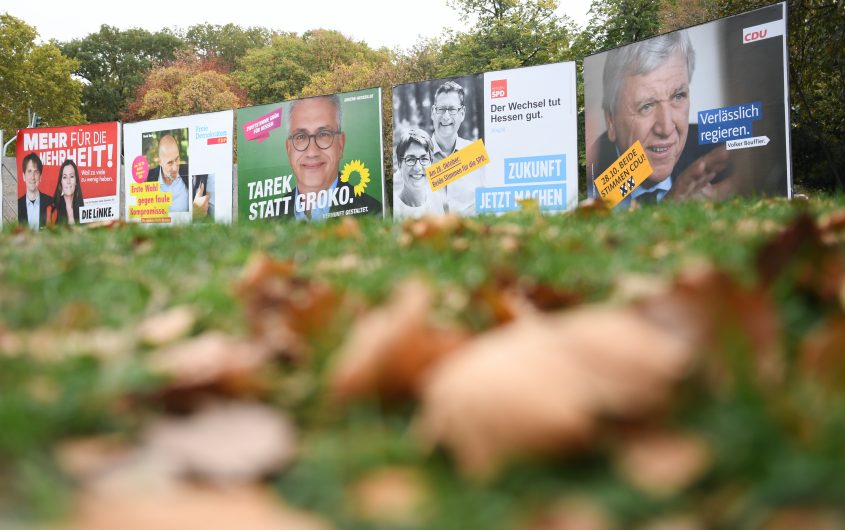
Arne Dedert/picture alliance via Getty Images
Berlin Is Not Bonn—But Also Not Weimar

Stephen F. Szabo
Senior Fellow
Dr. Stephen F. Szabo is a Senior Fellow at AICGS, where he focuses on German foreign and security policies and the new German role in Europe and beyond. Until 2017, he was the Executive Director of the Transatlantic Academy, a Washington, DC, based forum for research and dialogue between scholars, policy experts, and authors from both sides of the Atlantic. Prior to joining the German Marshall Fund in 2007, Dr. Szabo was Interim Dean and Associate Dean for Academic Affairs and taught European Studies at The Paul H. Nitze School of Advanced International Studies, Johns Hopkins University. He served as Professor of National Security Affairs at the National War College, National Defense University (1982-1990). He received his PhD in Political Science from Georgetown University and has been a fellow with the Alexander von Humboldt Stiftung, the Woodrow Wilson International Center for Scholars, and the American Academy in Berlin, as well as serving as Research Director at AICGS. In addition to SAIS, he has taught at the Hertie School of Governance, Georgetown University, George Washington University, and the University of Virginia. He has published widely on European and German politics and foreign policies, including. The Successor Generation: International Perspectives of Postwar Europeans, The Diplomacy of German Unification, Parting Ways: The Crisis in the German-American Relationship, and Germany, Russia and the Rise of Geo-Economics.
Today marks the end of a political era with Angela Merkel’s announcement not to seek reelection as party chair of the Christian Democrats in December. In the influential 1956 book Bonn ist nicht Weimar, Fritz Rene Allemann contended that the Bonn Republic would not follow the path of the ill-fated Weimar Republic of the 1920s and 1930s, but would prove to be a stable democracy. With unification in 1990, many began to write about the Berlin Republic as different than the one based in the Rheinland. The shift to Berlin raised a number of concerns. The new capital was close to Poland and eastern Europe and far from France and the Rheinland. Would the old visions of a “special path” (Sonderweg) and Mitteleuropa come back and weaken the connection to the West (Westbindung)? Would the move from the quiet village on the Rhine to the sprawling metropolis with its many difficult historical legacies and the tradition of protests undercut the comfortable consensus of Bonn? What impact would the 17 million Germans who knew the GDR and not the FRG have on the political culture?
The first decade of the new Republic seemed to quiet these concerns. The move of the capital to Berlin in 1999 did not seem to presage a major change. The party system, with the exception of the addition of Die Linke, remained stable and, like much else, was simply an extension of West Germany into the east. Germany remained anchored in NATO and the EU and showed signs of “normalization,” taking on a larger role under a new Red/Green government followed by the consensus-oriented Grand Coalitions and the return of the Liberal party to government. Helmut Kohl was replaced by Angela Merkel and the Berlin Republic produced only two chancellors in its now almost twenty years of existence. Alles In Ordnung.
The party system is now closer to Weimar than to Bonn, having gone from four mainly centrist parties in Bonn to now six or seven in Berlin.
Then came the pivotal year of 2015 and the decision by Chancellor Merkel to open the doors to over one million Muslim refugees. This was followed by both Brexit and the election of Donald Trump as president. With the federal elections last year and now with those in Bavaria and Hesse, we have seen that the Berlin Republic is quite different than Bonn and is coming to resemble Weimar in some ways. The party system is now closer to Weimar than to Bonn, having gone from four mainly centrist parties in Bonn to now six or seven in Berlin. The rise of the Alternative for Germany (AfD) is not an entirely new phenomena—the Bonn Republic experienced right-wing extreme parties like the NPD and Die Republikaner—but its spread across all of Germany is new and significant. With the recent elections it is now in all state parliaments. There is little reason to believe it is a flash party like its predecessors. The AfD’s success in the east and the proclivity for violence against foreigners in that part of Germany is an indication that the project to reunify the country is still very incomplete. Even more significant is the rapid decline of the two main Volksparteien, the Social Democrats and the Christian Democrats.
All of this is taking place in a larger context in which the main western anchors, NATO and the European Union, are clearly weaker than during the Bonn period. Add to this the rise of China, a new Russia, and right-wing populism throughout Europe, and the result is an undermining of the pillars of Westbindung. The return of a nationalist zero-sum world also threatens the multilateral foundation of German identity and its foreign policy. Finally, its highly successful economic condition rests overwhelmingly on export surpluses which are now threatened by looming trade wars. The end of the Merkel era will bring to power a generation that has come of age in the Berlin Republic and is now over seventy years removed from the Holocaust.
The end of the Merkel era will bring to power a generation that has come of age in the Berlin Republic and is now over seventy years removed from the Holocaust.
As Mark Twain once said, history does not repeat itself but it rhymes. Will Berlin become a different version of Weimar? Unlike 1919 when the Weimar Republic was born, Germany today is a winner in the world, not a defeated power. It has few historical resentments. While the party system is fragmenting, the extreme right seems limited to less than 20 percent of the vote. Die Linke are no longer an anti-system party and the electorate in recent elections is turning to democratic parties as alternatives to the old Volkparteien and seems to be rejecting the more extreme xenophobic temptations of the AfD. Anti-Semitism is not wide spread. Most importantly, unlike Weimar, which Peter Gay once described in Weimar Culture: The Outsider as Insider as a democracy without democrats, the political culture is deeply democratic and remains pro-European.
One of the key reasons for the tragedy that befell Europe in the 1930s was that fascism spread to the key country, Germany. Today Germany remains at its core an open society that will not succumb to the nationalist temptations that destroyed Weimar. It rejects the new authoritarianism of Trump, Putin, Erdogan, and Orban rather than embracing it. Berlin, unlike Bonn, is a diverse city that reflects a diverse and vibrant society. Munich is not the Munich of Hitler’s beer hall putsch but a dynamic, prosperous, and open city that welcomed the brunt of the refugee wave in 2015 and rejected the CSU’s attempt to co-opt the AfD. In short, Berlin is not Bonn and not Weimar. The Federal Republic we have come to know is gone. The new republic will be more normal in the sense that it will be less cohesive and stable and will resemble its neighbors. Most importantly, it will be less able to lead at a time when Europe is badly in need of a confident and coherent Germany.









